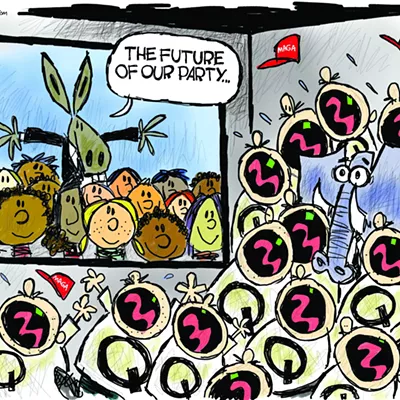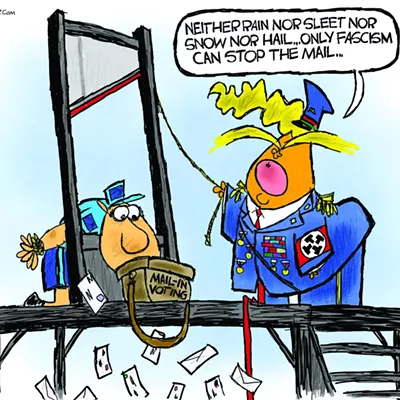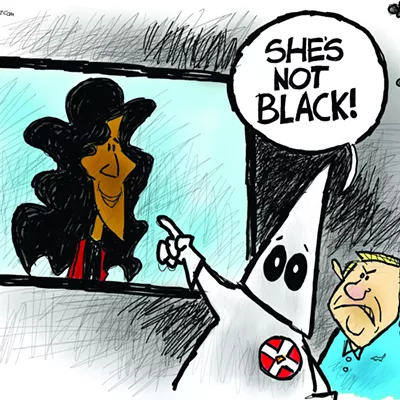2000
George W. Bush "defeats" Al Gore, and Americans learn about the hanging chad. Risner says the debacle in Florida made him interested in election integrity.
2002
Risner requests to be a Democratic Party elections observer, and realizes there isn't much to observe, since votes are counted by computers and not by elections staff. Local Democrat and computer-science professor Tom Ryan gets involved.
2003
Pima County Chairman Paul Eckerstrom creates an Elections Integrity Committee. Ryan co-authors a report on election-security concerns regarding Pima County's use of the Diebold voting machines and the GEMS software.
2004
Ryan and Risner have lunch with Brad Nelson to offer suggestions on how to improve election integrity. They asked Nelson to segregate early ballots in small batches and run a summary report after each batch; then officials can compare them later to see if they match precinct numbers in a hand count. Risner and Ryan are reportedly told it technically cannot be done.
2005
Risner contacts the Tucson elections department to find out if subtotals with each batch of early ballots could be printed and compared with a hand count later. Risner is told yes, leaving the committee wondering why the county can't do the same thing.
2006
On May 16, Democratic election observers are told they cannot observe the Regional Transportation Authority election, because it is nonpartisan, and by law, observers are not allowed. Observers stuck aroundanyway and took a picture of a Microsoft Access instruction book open in the election tabulator room. Microsoft Access is not allowed on the same computers used to tabulate votes, since it can be used to change outcomes in an undetectable method.
The Dems are given audit logs after the 2006 general election and notice summary reports were printed when observers were not watching election procedures. Printing summary reports early and sharing that information is a felony. When county officials are asked if Democrats can look at a video of the room from cameras installed to address election security, Risner says the county stalls; when he asks again, Risner says, he is told the cameras can only hold 20 days of footage, and the days from the election are gone. The summary reports are never found.
In December, the Dems file a public-records request for access to election database records to conduct an audit, and the request is denied. The county claims the files aren't considered public records and need to be protected.
2007
On Jan. 6, more than 300 Democrats at a committee meeting endorse a resolution asking Democratic supervisors Richard Elías, Ramón Valadez and Sharon Bronson to support and cooperate with the party's request for the database files. Nothing happens.The Dems ask Attorney General Terry Goddard to investigate possible evidence of tampering in the RTA election. On Sept. 14, Goddard holds a press conference to announce the investigation shows no signs of criminal activity, but that the GEMS tabulating software is flawed and has security issues.
On April 19, Dems file a lawsuit asking for database files going back to 1998. Risner says that according to state statutes, political parties are required to monitor elections, and the databases are needed in order to fulfill that obligation.
During depositions, Risner learns that Crane regularly took the election database records home on disk, that summary reports were regularly printed for officials and that Crane purchased a "crop scanner" in July 2005. (Usually used to analyze corn crops, crop scanners can also be used to hack memory cards. Crane said during the deposition that he purchased one after reading about them on an election-integrity Web site, tested it to see if it was true and discovered that it can hack memory cards. The scanner stayed at his workplace.)
On Dec. 18, Judge Michael Miller rules that the Dems can have files from the 2006 primary and general elections. If they can prove having the remaining files does not create a security risk, they can come back and ask for the remaining files.
2008
On, Jan. 8, the Board of Supervisors, in front of a packed room, vote to withdraw an appeal of Miller's decision filed by the county attorney. Bronson makes a motion to give the party one database file from the 2006 primary; the vote is 4-1. Republican Supervisor Ray Carroll wants an amendment attached asking the supervisors to vote to provide all of the database files. The supervisors say no, and the crowd goes crazy, shouting at the supervisors. After several speakers testify, Chairman Richard Elías moves for a new vote asking the supervisors to release all of the database files ordered by Miller. The vote then turns 5-0 in favor of releasing the database files. The crowd again goes crazy--this time with cheers.On Jan. 15, the supervisors vote 3-2 to not release files (Elías and Carroll vote to release) after Risner asks Miller to make election files available after every election, since Arizona law allows only five days to contest an election.
On May 23, Miller rules the Dems can have the remaining database files going back to 1998--including the RTA files--and files from all future elections.
On July 9, Risner and AuditAZ hold a press conference after Pima County Treasurer Beth Ford announces that she needs to destroy the RTA ballots, according to state law. Risner demands that ballots be kept, as does Pima County Administrator Chuck Huckelberry. Risner says he has evidence that the RTA election was indeed manipulated, including an affidavit from a former county employee who says he talked to Crane at the Boondocks Lounge, where Crane allegedly admitted that he messed with the RTA at his boss' direction. Risner calls for an investigation, and just about everyone is asking for a full recount.
NOW
The hard drive with the remaining database files continues to sit in a vault in the Superior Court clerk's office, because the county and Democratic Party can't agree on the best way to hand over the hard drive. The county and the party are waiting to receive a court date after Risner filed a motion on Aug. 6 demanding that the court release the hard drive immediately.Risner is also waiting to receive the attorney fees awarded to him by Miller in May. On Aug. 18, Risner sent a letter to the county asking about the payment of more than $228,000 for attorney's fees and costs. When Risner finally gets paid, those numbers will be bigger, since the awards accrue 10 percent interest until paid.
County spokesman John Moffatt says the check was cut on Friday, Aug. 22.









